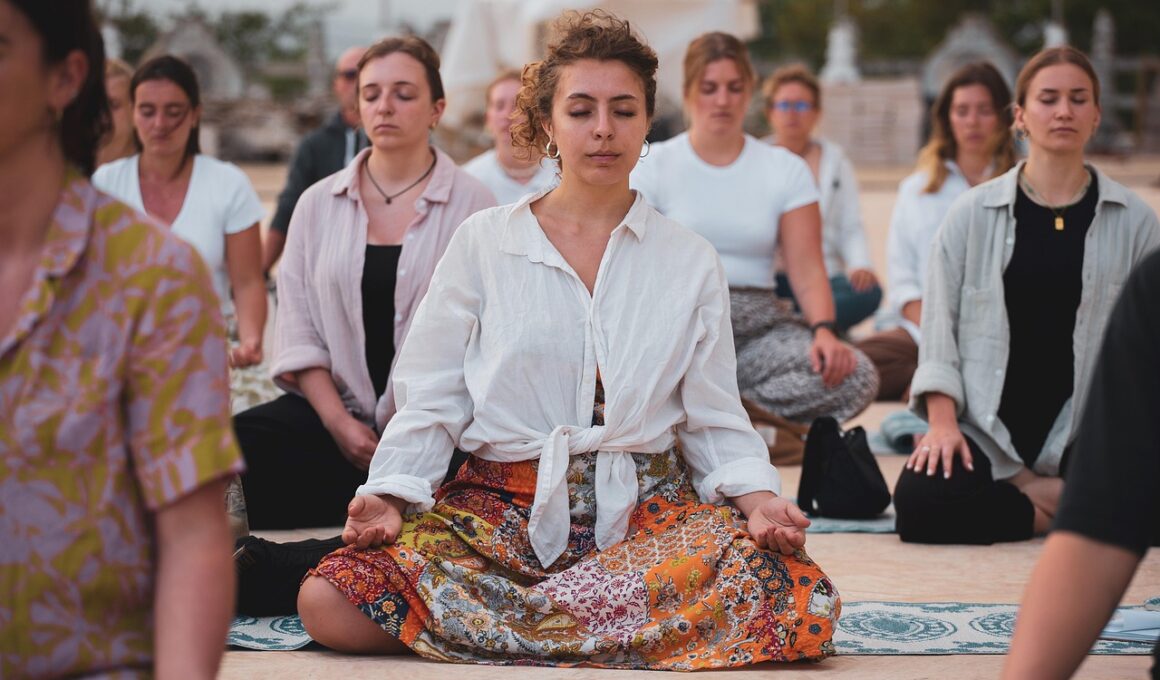The Science Behind Group Meditation and Its Impact on Stress Reduction
Meditation has long been recognized as a powerful tool for reducing stress, fostering a sense of peace, and enhancing overall well-being. In recent years, scientific research has increasingly focused on the benefits of group meditation. This form of meditation creates a supportive community, allowing individuals to share experiences and strengthen their mindfulness practices together. Studies show that participating in group meditation can lead to a variety of beneficial outcomes such as lower anxiety levels, improved emotional regulation, and heightened feelings of connectedness with others. These benefits are crucial in today’s fast-paced world, where stress is often prevalent and mental health issues are on the rise. Moreover, meditation in a group setting encourages accountability, as individuals are more likely to maintain their practice when they commit to attending a session with others. The combined energy and intention of a collective meditation experience can magnify each participant’s mindfulness efforts, creating a deeper emotional impact. As we delve into the reasons why group meditation is effective, we can gain insights into how to best incorporate it into our lives.
One of the primary reasons group meditation works so effectively lies in the shared experience it fosters among participants. When individuals come together, they create a unique energy that enhances the experience for everyone involved. This energy can increase focus and allow practitioners to enter a meditative state more deeply than they might achieve alone. The rhythm of collective breathing can synchronize, enabling participants to tap into each other’s calmness and tranquility. Research has demonstrated that this shared rhythm can facilitate deeper relaxation, helping to lower cortisol levels — the hormone associated with stress. Furthermore, engaging in group meditation strengthens social bonds and builds a sense of belonging among participants. These social connections are key to emotional resilience, allowing individuals to support one another outside of the meditation space. As members develop trust and camaraderie, they are more likely to share their personal struggles and triumphs, blending collective wisdom into their individual mindfulness journeys. Therefore, individuals who frequently participate in group meditation are likely to experience a more sustainable, long-term reduction in stress compared to solitary practitioners.
The use of specific meditation techniques during group sessions can further enhance stress reduction effectiveness. Techniques like guided imagery, progressive muscle relaxation, or loving-kindness meditation can be extremely powerful when practiced collectively. Guided sessions enable practitioners to access deeper layers of relaxation and mindfulness by listening to the facilitator’s voice and following shared visualizations. Loving-kindness meditation, which encourages sending compassionate thoughts to oneself and others, can uniquely strengthen emotional connections amongst group members. This kind of meditation invites feelings of empathy and kindness, which are essential for navigating stressful situations in daily life. Ultimately, such practices can create a collective sense of calm, fostering an environment that alleviates stress and nurtures emotional understanding. Additionally, evidence indicates that different meditation techniques can yield varying benefits, showcasing the importance of adapting practices to meet the group’s specific goals and dynamics. Each session’s uniqueness can inspire participants to explore new ways of connecting to their minds and bodies collectively, thus enriching their meditation experience.
Importantly, community aspects of group meditation can alleviate feelings of isolation that often accompany stress. Engaging with others who share a common interest in mindfulness fosters connection through shared vulnerability. This connection helps build a strong support network that individuals can rely on during tough times. It creates an inviting atmosphere for social interactions, encouraging participants to share their meditation insights and personal struggles. As participants relate to each other, they reinforce one another’s meditation practices and emotional well-being. Research emphasizes that social support serves as a buffer against stress, suggesting that knowing others are also engaged in processing similar experiences can ease the mind. Such communities cultivate a shared understanding and acknowledge the challenges inherent in life. Thus, group settings play a vital role as participants can feel authentic support from their peers, thus improving their mental health outcomes. With consistent group meditation practice, not only do individuals learn effective techniques for alleviating stress, but they also develop tangible relationships that provide holistic support.
In conclusion, the science behind group meditation highlights its multitude of benefits, particularly in stress reduction. By harnessing the collective energy of participants, sharing various meditation techniques, enhancing accountability, fostering psychological resilience, and creating supportive communities, group meditation addresses the growing need for stress management in modern society. Through these experiences, individuals can experience lasting change not only within their own mental states but also within the social framework around them. Recognizing the intricacies of group dynamics in meditation helps us appreciate why some may find greater success in collective practices compared to solo endeavors. Furthermore, as society places greater emphasis on mental health and well-being, embracing group meditation becomes increasingly pertinent. It provides an avenue for cultivating mindfulness, building strong relationships, and developing a healthier approach to stress. Ultimately, group meditation presents a powerful mechanism to tackle stress while creating a vibrant community where individuals support one another on their journeys toward optimal mental health.
To further explore the impact of group meditation on stress reduction, consider participating in a local meditation group or finding like-minded individuals who share similar interests. As one embarks on this journey, it’s essential to be open to new experiences and embrace the community that forms around these practices. The rewards can be profound, providing comfort and support as you navigate the complexities of life. In the fast-paced world we live in, prioritizing mental health and leveraging collective mindfulness experiences could be the key to achieving equilibrium. Through group meditation, individuals not only enhance their mental well-being but also contribute to establishing an even more mindful society. Together, we can elevate attention towards long-term mental health, stress reduction, and overall well-being. Let’s celebrate the incredible potential of group meditation to bring about positive change both individually and collectively.


